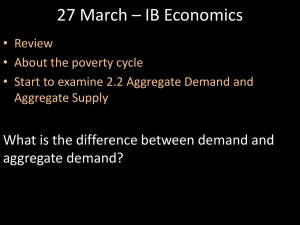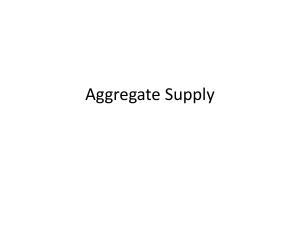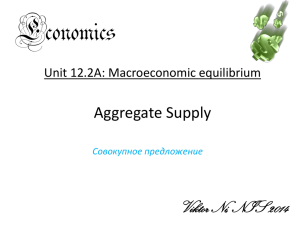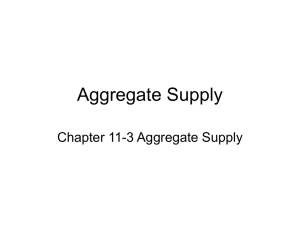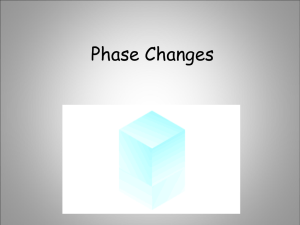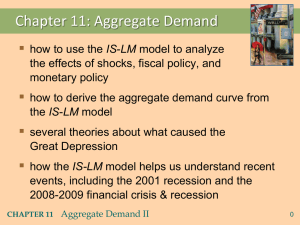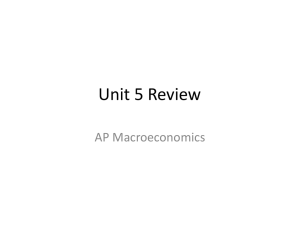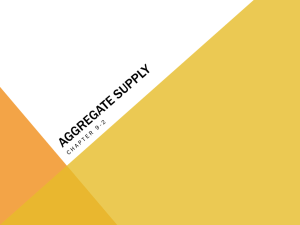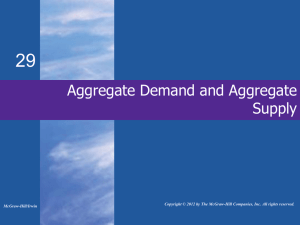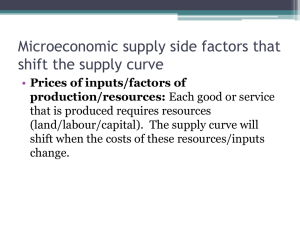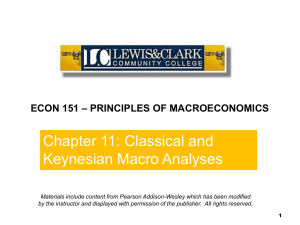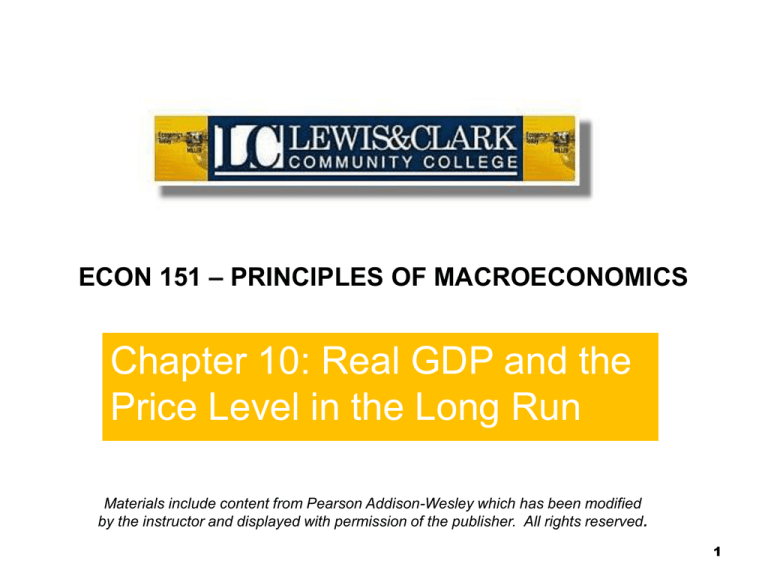
End of
Chapter
10
ECON 151 – PRINCIPLES
OF MACROECONOMICS
Chapter
10
Chapter 10: Real GDP and the
Price Level in the Long Run
Materials include content from Pearson Addison-Wesley which has been modified
by the instructor and displayed with permission of the publisher. All rights reserved.
1
1
Output Growth and the LongRun Aggregate Supply Curve
Aggregate Supply
The
total of all planned production for
the economy
10-2
Output Growth and the Long-Run Aggregate
Supply Curve (cont'd)
Long-Run Aggregate Supply Curve
A
vertical line representing the real output of
goods and services after full adjustment has
occurred
It
represents the real GDP of the economy
under conditions of full employment;
the economy is near its production
possibilities curve
10-3
Figure 10-1 The Production Possibilities and the
Economy’s Long-Run Aggregate Supply Curve
10-4
Output Growth and the Long-Run Aggregate
Supply Curve (cont'd)
LRAS is vertical
Input
prices fully adjust to changes in output
prices
Suppliers
have no incentive to
increase output
Unemployment
is at the natural rate
Determined
by endowments and technology
(or existing resources)
10-5
Output Growth and the Long-Run Aggregate
Supply Curve (cont'd)
Growth is shown by outward shifts of
either the production possibilities curve or
the LRAS curve caused by
Growth
of population and the labor-force
participation rate
Capital
accumulation
Improvements
in technology
10-6
Figure 10-2 The Long-Run Aggregate
Supply Curve and Shifts in It
10-7
Figure 10-3 A Sample LongRun Growth Path for Real GDP
10-8
Total Expenditures
and Aggregate Demand
Aggregate Demand
The
total of all planned expenditures in the
entire economy (planned may not equal actual)
Aggregate Demand Curve
A
curve showing planned purchase rates for
all final goods and services in the economy at
various price levels, all other things held
constant
10-9
Aggregate Demand versus
Demand for a Single Good
When the aggregate demand curve is
derived, we are looking at the entire
circular flow of income and product.
When a demand curve is derived, we are
looking at a single product in one market
only.
Note the labels on the respective graphs
are different.
10-10
Figure 10-4
The Aggregate Demand Curve
As the price
level rises, real
GDP declines
10-11
The Aggregate Demand
Curve (cont'd)
What happens when the price
level rises or falls?
The
real-balance effect (or wealth effect)
The
interest rate effect
The
open economy effect
10-12
The Aggregate Demand Curve (cont'd)
The Real-Balance Effect
The
change in the real value of money balances
when the price level changes
The Interest Rate Effect
Higher
price levels indirectly increase the interest
rate, which in turn causes a reduction in borrowing
and spending.
The Open Economy Effect
Higher
price levels result in foreigners’ desiring to buy
fewer American-made goods while Americans desire
more foreign-made goods (i.e., net exports fall).
10-13
GDP Deflator
Movement Along the Aggregate
Demand Curve
120
90
AD
0
1
2
3
4
5
Real GDP per Year
($ trillions)
6
7
10-14
Shifts in the Aggregate
Demand Curve
Any non-price-level change that increases
aggregate spending (on domestic goods)
shifts AD to the right.
Any non-price-level change that decreases
aggregate spending (on domestic goods)
shifts AD to the left.
10-15
Table 10-1 Determinants of
Aggregate Demand
10-16
Shifts in the Aggregate
Demand Curve (cont'd)
GDP Deflator
Increase in aggregate demand
120
90
AD
0
1
2
3
4
5
Real GDP per Year
($ trillions)
6
AD1
7
10-17
Shifts in the Aggregate
Demand Curve (cont'd)
GDP Deflator
Decrease in aggregate demand
120
100
0
9
10
11
12
AD1
AD
13
14
Real GDP per Year
($ trillions)
15
10-18
Long-Run Equilibrium
and the Price Level
For the economy as a whole, long-run
equilibrium occurs at the price level where
the aggregate demand curve (AD) crosses
the long-run aggregate supply curve
(LRAS).
10-19
Figure 10-5 Long-Run
Economywide Equilibrium
10-20
Long-Run Equilibrium
and the Price Level (cont'd)
The effects of economic growth on the
price level
Economic
growth and secular deflation
Secular Deflation
A
persistent decline in prices resulting from
economic growth in the presence of stable
aggregate demand
10-21
Secular Deflation versus Long-Run Price
Stability in a Growing Economy
Secular deflation
An
increase in LRAS will, ceteris paribus, result in a
decrease in the price level.
Avoiding secular deflation
If
the AD curve shifts outward by the same amount as
the LRAS curve, the price level remains constant.
The AD curve can be shifted outward by increasing the
money supply.
10-22
Figure 10-6 Secular Deflation versus LongRun Price Stability in a Growing Economy,
Panel (a)
10-23
Figure 10-6 Secular Deflation versus LongRun Price Stability in a Growing Economy,
Panel (b)
10-24
Figure 10-7 Inflation Rates
in the United States
Source: Economic Report of the President; Economic Indicators, various issues
10-25
Figure 10-8 Explaining
Persistent Inflation, Panel (a)
• When LRAS1 shifts to
LRAS2, the price level
rises from 120 to 140
• Inflation is caused by
a decrease in LRAS
10-26
Figure 10-8 Explaining
Persistent Inflation, Panel (b)
An increase in AD from AD1
to AD2 causes the price
level to rise from 120 to 140,
and an increase in AD
causes inflation
10-27
Figure 10-9 Real GDP and
the Price Level in the United States,
1970 to the Present
10-28
End of
ECON 151 – PRINCIPLES
OF MACROECONOMICS
Chapter
10
Chapter 10: Real GDP and the
Price Level in the Long Run
Materials include content from Pearson Addison-Wesley which has been modified
by the instructor and displayed with permission of the publisher. All rights reserved.
29

